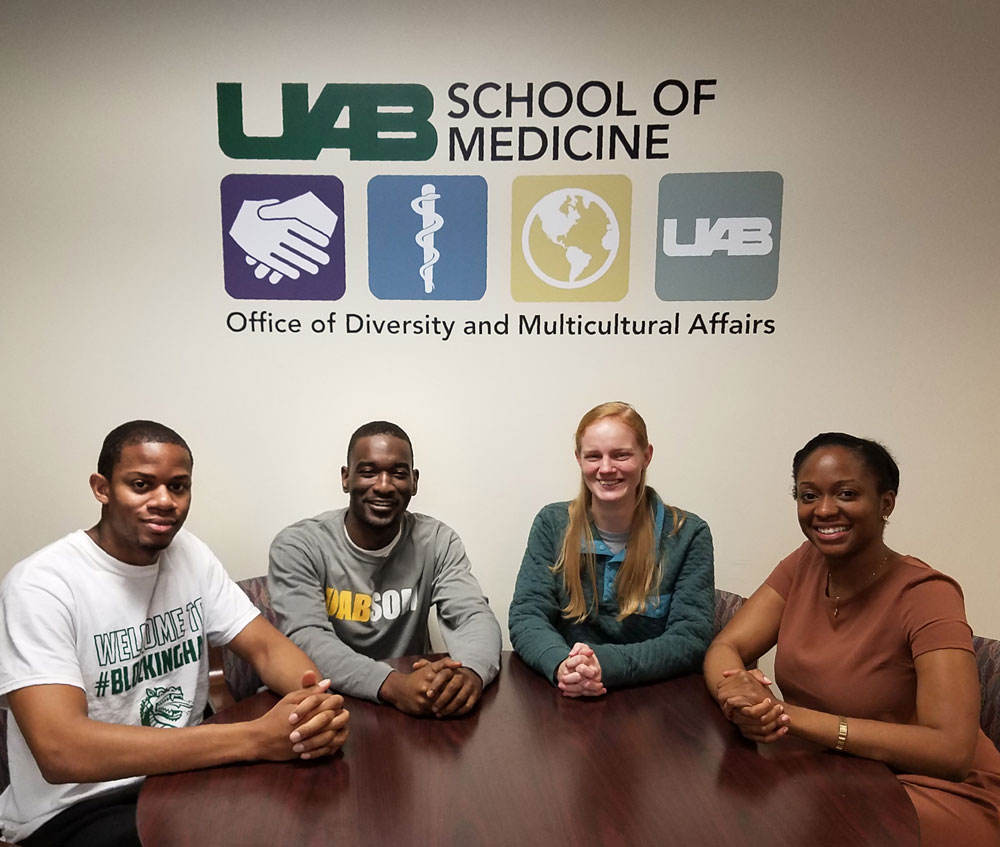 Officers in the UAB School of Medicine chapter of the Student National Medical Association.Early on Saturday morning, Feb. 25, high school and college students from across Alabama will gather on the UAB campus for the 13th annual Integrative Health Care Summit to learn about the myriad possibilities available to them in the study of health professions.
Officers in the UAB School of Medicine chapter of the Student National Medical Association.Early on Saturday morning, Feb. 25, high school and college students from across Alabama will gather on the UAB campus for the 13th annual Integrative Health Care Summit to learn about the myriad possibilities available to them in the study of health professions. Sponsored by the UAB School of Medicine chapter of the Student National Medical Association, exposing students from underrepresented populations to a broad spectrum of careers in health-related fields, including optometry, pharmacy, physical therapy, dentistry, medicine, nursing and public health.
“We talk to the students about more than just their career choice,” said Jarvis Johnson, SMNA vice president. “From the beginning, you have to develop good habits. Students need to work on time management and organization, and be aware of their social media presence.”
The UAB chapter of the SNMA is headed by second-year medical students Chisom Ifediba, president; Jarvis Johnson, vice president; Maurice Asouzu, treasurer, and Grace Raines, secretary. Together, these students coordinate the health fairs, educational outreach effort, and pipeline development programs that characterize the work of the organization.
“SNMA’s focus on underserved and underprivileged communities drew me to SNMA,” Ifediba said. “We have a unique way of looking at things—we don’t just focus on health disparities, we strengthen the pipeline programs and make sure that individuals can be educated and then go back to serve their communities.”
In addition to the summit, SMNA heads other community engagement initiatives, including free medical fairs, held throughout the Birmingham community.
“We’re making a difference. Not everyone has access to health care, and some people at those fairs haven’t seen a doctor in five or six years,” Asouzu said. “By checking blood pressures and glucose levels, we could be helping people to catch a potentially serious health condition.”
In conjunction with medical student David Osula and the Academy of the Health Sciences, the SNMA performed mentoring outreach at Carver High School.
“I feel like it was important for us to let the Carver students know that medical school is a possibility for them,” Raines said. “The girl that I was mentoring at Carver told me, ‘Everyone just says that graduating from high school is great.’ She just was never told that college was a possibility.”
The SNMA is working to help high school and college students change their perceptions of their own limitations, to reach out to the local community, and also to provide a mechanism for addressing issues of equity and inclusion within the medical school student body.
“SNMA gives the student body a platform to talk about health disparities and to talk about being an underrepresented minority in medical school. It provides a safe, non-judgmental area,” Ifediba said.
“Overall, what SNMA does is keep reminding you why you’re working to become a doctor,” Johnson said. “It gets us out of the books and into the community. It keeps your empathy level high. One of the things they talk to us about in medical school is that as we progress, we’re at risk of losing our empathy. Doing what we do helps keep our empathy.”